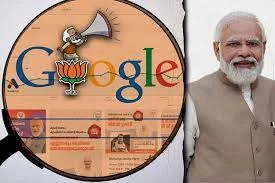Massive Expenditure Raises Questions About Electoral Strategies and Financial Transparency
NEW DELHI – The Bharatiya Janata Party (BJP) has once again sparked debate over its significant digital presence, as reports reveal a staggering expenditure of Rs 30 crore within a mere 30-day period on Google Ads, fuelling discussions on electoral strategies and financial transparency.
In an unprecedented move, the BJP’s substantial investment in online advertising underscores its strategic emphasis on leveraging technology to amplify its message, particularly targeting voters in North Indian states where electoral contests are intense. This digital onslaught signifies the party’s concerted effort to sway voter sentiment and solidify its support base, turning the digital landscape into a battleground for political influence.
Critics have voiced concerns regarding the lack of transparency surrounding political expenditures in the digital sphere. The scale of the BJP’s spending raises pertinent questions about the origins of funds and the potential influence of corporate entities in shaping political narratives. This highlights the urgent need for stringent regulations to uphold the integrity of the electoral process and ensure accountability in electoral financing.
Responding to inquiries about the substantial digital outlay, BJP officials have stressed the party’s commitment to utilizing technology to connect with voters and articulate its governance vision. They justify the expenditure as necessary for engaging citizens and promoting the BJP’s policy agenda, citing the broad reach and cost-effectiveness of online platforms.
However, lingering concerns persist over the implications of unchecked digital spending on the democratic process, especially in a diverse country like India. The growing influence of social media and online platforms in shaping public opinion raises debates about regulating political advertising and preventing undue influence on the electoral landscape.
The BJP’s formidable digital machinery, characterized by data analytics and targeted messaging, highlights the evolving nature of political communication in the digital age. As parties increasingly utilize algorithms to micro-target specific demographics, ethical questions arise about leveraging personal data for political gain and its broader implications for democratic discourse.
With crucial state elections on the horizon and the looming 2024 general elections, the BJP’s digital blitz underscores the complex interplay between technology, politics, and democracy. Beyond flashy advertisements lies a deeper examination of the role of money and influence in shaping electoral competition, prompting a critical reflection on the state of India’s democratic institutions.

